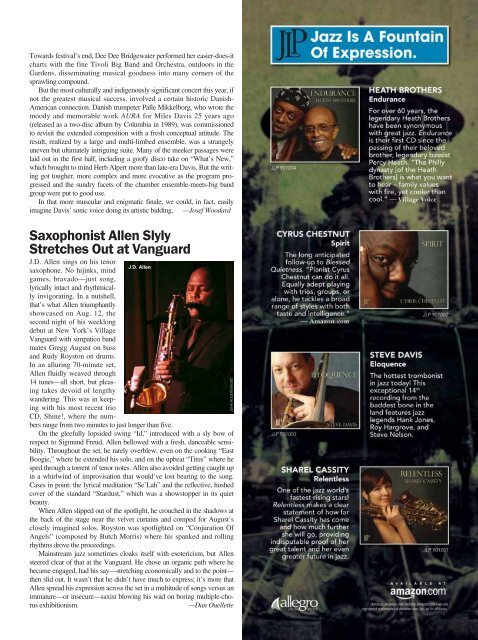Create successful ePaper yourself
Turn your PDF publications into a flip-book with our unique Google optimized e-Paper software.
Towards festival’s end, Dee Dee Bridgewater performed her easier-does-it<br />
charts with the fine Tivoli Big Band and Orchestra, outdoors in the<br />
Gardens, disseminating musical goodness into many corners of the<br />
sprawling compound.<br />
But the most culturally and indigenously significant concert this year, if<br />
not the greatest musical success, involved a certain historic Danish-<br />
American connection. Danish trumpeter Palle Mikkelborg, who wrote the<br />
moody and memorable work AURA for Miles Davis 25 years ago<br />
(released as a two-disc album by Columbia in 1989), was commissioned<br />
to revisit the extended composition with a fresh conceptual attitude. The<br />
result, realized by a large and multi-limbed ensemble, was a strangely<br />
uneven but ultimately intriguing suite. Many of the meeker passages were<br />
laid out in the first half, including a goofy disco take on “What’s New,”<br />
which brought to mind Herb Alpert more than late-era Davis. But the writing<br />
got tougher, more complex and more evocative as the program progressed<br />
and the sundry facets of the chamber ensemble-meets-big band<br />
group were put to good use.<br />
In that more muscular and enigmatic finale, we could, in fact, easily<br />
imagine Davis’ sonic voice doing its artistic bidding. —Josef Woodard<br />
Saxophonist Allen Slyly<br />
Stretches Out at Vanguard<br />
J.D. Allen<br />
J.D. Allen sings on his tenor<br />
saxophone. No hijinks, mind<br />
games, bravado—just song,<br />
lyrically intact and rhythmically<br />
invigorating. In a nutshell,<br />
that’s what Allen triumphantly<br />
showcased on Aug. 12, the<br />
second night of his weeklong<br />
debut at New York’s Village<br />
Vanguard with simpatico band<br />
mates Gregg August on bass<br />
and Rudy Royston on drums.<br />
In an alluring 70-minute set,<br />
Allen fluidly weaved through<br />
14 tunes—all short, but pleasing<br />
takes devoid of lengthy<br />
wandering. This was in keeping<br />
with his most recent trio<br />
CD, Shine!, where the numbers<br />
range from two minutes to just longer than five.<br />
On the gleefully lopsided swing “Id,” introduced with a sly bow of<br />
respect to Sigmund Freud, Allen bellowed with a fresh, danceable sensibility.<br />
Throughout the set, he rarely overblew, even on the cooking “East<br />
Boogie,” where he extended his solo, and on the upbeat “Titus” where he<br />
sped through a torrent of tenor notes. Allen also avoided getting caught up<br />
in a whirlwind of improvisation that would’ve lost bearing to the song.<br />
Cases in point: the lyrical meditation “Se’Lah” and the reflective, hushed<br />
cover of the standard “Stardust,” which was a showstopper in its quiet<br />
beauty.<br />
When Allen slipped out of the spotlight, he crouched in the shadows at<br />
the back of the stage near the velvet curtains and comped for August’s<br />
closely imagined solos. Royston was spotlighted on “Conjuration Of<br />
Angels” (composed by Butch Morris) where his spanked and rolling<br />
rhythms drove the proceedings.<br />
Mainstream jazz sometimes cloaks itself with esotericism, but Allen<br />
steered clear of that at the Vanguard. He chose an organic path where he<br />
became engaged, had his say—stretching economically and to the point—<br />
then slid out. It wasn’t that he didn’t have much to express; it’s more that<br />
Allen spread his expression across the set in a multitude of songs versus an<br />
immature—or insecure—saxist blowing his wad on boring multiple-chorus<br />
exhibitionism.<br />
—Dan Ouellette<br />
JOHN ROGERS/WGBO<br />
November 2009 DOWNBEAT 21

















